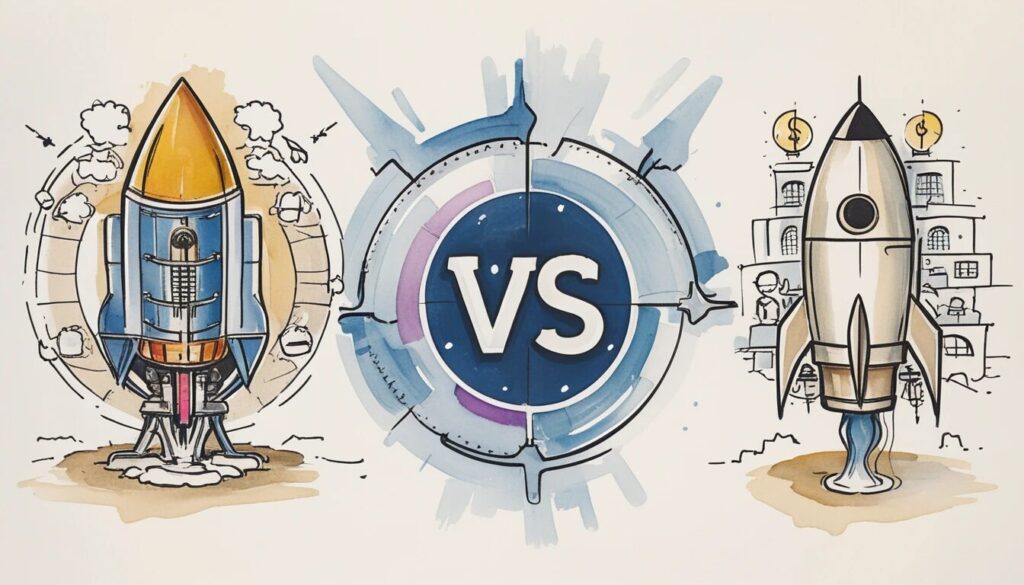Incubator vs Accelerator: Which Path Will Propel Your Startup?
Starting a business is an exhilarating journey filled with opportunities and challenges. Did you know that around 90% of startups fail, with lack of market need and funding being the primary reasons? That’s where startup incubators and accelerators come into play. These programs, designed to nurture and grow young companies, can make all the difference between success and failure. But which one is the right fit for your business? Understanding the differences between a startup incubator vs accelerator is essential to making an informed decision. Let’s dive into what sets them apart and how to choose the best path for your startup’s success!
What Are Startup Accelerators?
- Definition and objectives of startup accelerators
- Benefits of startup accelerators, such as mentorship and networking
- Key factors to consider when deciding on an accelerator program
Startup accelerators are intensive programs designed to help early-stage companies grow rapidly within a short timeframe. Typically lasting between three to six months, accelerators provide startups with funding, mentorship, and access to a network of investors and industry experts. These programs are best suited for businesses that already have a minimum viable product (MVP) and are ready to scale.
The benefits of startup accelerators are immense. Participants gain invaluable mentorship from seasoned entrepreneurs and industry leaders who guide them through challenges and offer strategic advice. Networking opportunities are another key advantage, as accelerators connect startups with potential investors, partners, and customers. Moreover, many accelerators offer resources like office space, workshops, and branding services to help startups fine-tune their operations.
When considering an accelerator program, evaluate your startup’s stage of development, revenue streams, and expansion goals. Do you have a proven concept and paying customers? Are you prepared for the fast-paced nature of an accelerator? If so, this could be the perfect opportunity to propel your business to the next level.
What Are Startup Incubators?
- Definition and objectives of startup incubators
- Resources and support offered by incubators
- How to determine if an incubator is the right fit
Startup incubators focus on nurturing early-stage businesses that are still in the idea phase or need help developing their business model. Unlike accelerators, incubators typically don’t have a fixed timeline, allowing startups to grow at their own pace. These programs provide a supportive environment filled with mentorship, coworking spaces, and access to industry resources.
Incubators are often backed by academic institutions, government organizations, or non-profits. They provide invaluable guidance, helping founders refine their business strategies, validate their ideas, and navigate the challenges of starting a company. Additionally, incubators may offer financial support, legal advice, marketing assistance, and connections to local networks, reducing the burden on cash-strapped entrepreneurs.
To determine if an incubator is the right choice, assess your startup’s current stage and needs. Are you in the process of developing your business idea? Do you need access to mentorship and foundational resources? If so, an incubator could be the ideal platform to transform your vision into a viable business.
Key Differences Between Incubators and Accelerators
- Stage of entry: idea stage vs growth stage
- Funding models and equity requirements
- Program duration and structure
- Cost considerations and location requirements
- Acceptance criteria and application process
While both incubators and accelerators aim to support startups, their approaches differ significantly. Incubators cater to seed-stage startups, helping them develop ideas and build solid business foundations. In contrast, accelerators focus on startups ready to scale, offering funding and resources in exchange for equity.
Incubators are often free or charge minimal fees, while accelerators typically require participants to give up a percentage of equity. Furthermore, incubators have flexible timelines, whereas accelerators operate on a fixed schedule, emphasizing rapid growth. Location is another factor; incubators often require startups to be physically present, while accelerators may work with businesses that already have established operations.
Acceptance criteria also vary. Incubators are generally less competitive, focusing on nurturing diverse startups. Accelerators, on the other hand, have rigorous application processes, prioritizing companies with proven traction and growth potential.
How to Choose Between an Incubator and an Accelerator
- Evaluate your startup’s stage of development
- Assess funding needs and equity considerations
- Identify industry alignment and specialization
- Consider time commitment and program structure
- Explore networking opportunities and location benefits
Choosing between an incubator and an accelerator requires careful consideration of your startup’s unique needs and goals. If you’re in the early stages of idea development, an incubator can provide the mentorship and resources needed to refine your business model. Conversely, if you’re ready to scale and attract investors, an accelerator’s intensive program could be the right fit.
Assess the funding models of each program. Accelerators often demand equity in exchange for their services, while incubators may offer support without such requirements. Consider the time commitment as well; accelerators usually require full-time dedication, while incubators have more flexible timelines.
Industry alignment is another critical factor. Look for programs that specialize in your niche, as they can provide tailored mentorship and resources. Networking opportunities and location should also play a role in your decision. For instance, an urban accelerator may offer access to a broader network, while a local incubator could provide strong community ties.
Conclusion
Understanding the differences between incubators and accelerators is key to choosing the right path for your startup. Incubators are ideal for nurturing early-stage ideas, offering mentorship and foundational support, while accelerators are perfect for scaling businesses ready to grow rapidly. Evaluate your startup’s stage, funding needs, industry alignment, and time commitment to make the best decision.
No matter which route you choose, remember that the journey of entrepreneurship is a continuous learning process. Leverage the resources, mentorship, and networks provided by these programs to fuel your growth. The right choice could be the catalyst that propels your startup to new heights!
